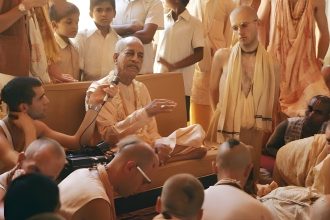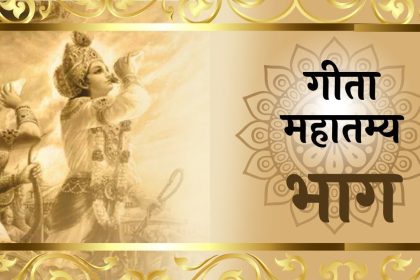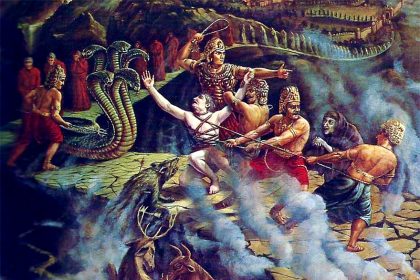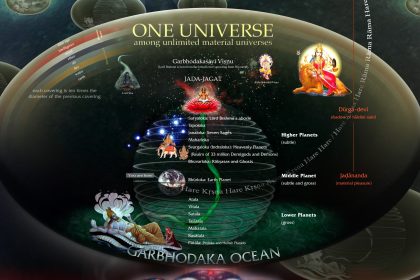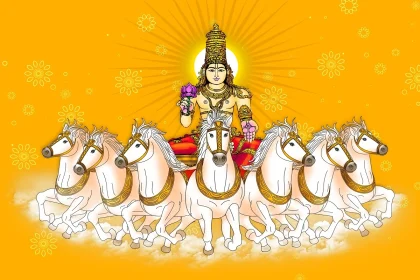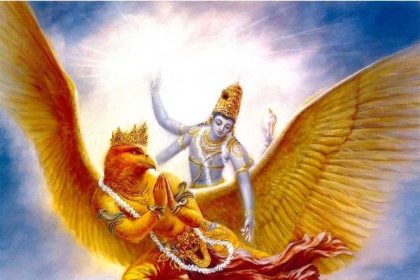TEXT 18
karmaṇy akarma yaḥ paśyed
akarmaṇi ca karma yaḥ
sa buddhimān manuṣyeṣu
sa yuktaḥ kṛtsna-karma-kṛt
SYNONYMS
karmaṇi—in action; akarma—inaction; yaḥ—one who; paśyet—observes; akarmaṇi—in inaction; ca—also; karma—fruitive action; yaḥ—one who; saḥ—he; buddhi-mān—is intelligent; manuṣyeṣu—in human society; saḥ—he; yuktaḥ—is in the transcendental position; kṛtsna-karma-kṛt—although engaged in all activities.
TRANSLATION
One who sees inaction in action, and action in inaction, is intelligent among men, and he is in the transcendental position, although engaged in all sorts of activities.
PURPORT
A person acting in Kṛṣṇa consciousness is naturally free from the bonds of karma. His activities are all performed for Kṛṣṇa; therefore he does not enjoy or suffer any of the effects of work. Consequently he is intelligent in human society, even though he is engaged in all sorts of activities for Kṛṣṇa. Akarma means without reaction to work. The impersonalist ceases fruitive activities out of fear, so that the resultant action may not be a stumbling block on the path of self-realization, but the personalist knows rightly his position as the eternal servitor of the Supreme Personality of Godhead. Therefore he engages himself in the activities of Kṛṣṇa consciousness. Because everything is done for Kṛṣṇa, he enjoys only transcendental happiness in the discharge of this service. Those who are engaged in this process are known to be without desire for personal sense gratification. The sense of eternal servitorship to Kṛṣṇa makes one immune to all sorts of reactionary elements of work.
TEXT 19
yasya sarve samārambhāḥ
kāma-saṅkalpa-varjitāḥ
jñānāgni-dagdha-karmāṇaṁ
tam āhuḥ paṇḍitaṁ budhāḥ
SYNONYMS
yasya—one whose; sarve—all sorts of; samārambhāḥ—attempts; kāma—based on desire for sense gratification; saṅkalpa—determination; varjitāḥ—are devoid of; jñāna—of perfect knowledge; agni—by the fire; dagdha—burned; karmāṇam—whose work; tam—him; āhuḥ—declare; paṇḍitam—learned; budhāḥ—those who know.
TRANSLATION
One is understood to be in full knowledge whose every endeavor is devoid of desire for sense gratification. He is said by sages to be a worker for whom the reactions of work have been burned up by the fire of perfect knowledge.
PURPORT
Only a person in full knowledge can understand the activities of a person in Kṛṣṇa consciousness. Because the person in Kṛṣṇa consciousness is devoid of all kinds of sense-gratificatory propensities, it is to be understood that he has burned up the reactions of his work by perfect knowledge of his constitutional position as the eternal servitor of the Supreme Personality of Godhead. He is actually learned who has attained to such perfection of knowledge. Development of this knowledge of eternal servitorship to the Lord is compared to fire. Such a fire, once kindled, can burn up all kinds of reactions to work.
TEXT 20
tyaktvā karma-phalāsaṅgaṁ
nitya-tṛpto nirāśrayaḥ
karmaṇy abhipravṛtto ‘pi
naiva kiñcit karoti saḥ
SYNONYMS
tyaktvā—having given up; karma-phala-āsaṅgam—attachment for fruitive results; nitya—always; tṛptaḥ—being satisfied; nirāśrayaḥ—without any shelter; karmaṇi—in activity; abhipravṛttaḥ—being fully engaged; api—in spite of; na—does not; eva—certainly; kiñcit—anything; karoti—do; saḥ—he.
TRANSLATION
Abandoning all attachment to the results of his activities, ever satisfied and independent, he performs no fruitive action, although engaged in all kinds of undertakings.
PURPORT
This freedom from the bondage of actions is possible only in Kṛṣṇa consciousness, when one is doing everything for Kṛṣṇa. A Kṛṣṇa conscious person acts out of pure love for the Supreme Personality of Godhead, and therefore he has no attraction for the results of the action. He is not even attached to his personal maintenance, for everything is left to Kṛṣṇa. Nor is he anxious to secure things, nor to protect things already in his possession. He does his duty to the best of his ability and leaves everything to Kṛṣṇa. Such an unattached person is always free from the resultant reactions of good and bad; it is as though he were not doing anything. This is the sign of akarma, or actions without fruitive reactions. Any other action, therefore, devoid of Kṛṣṇa consciousness, is binding upon the worker, and that is the real aspect of vikarma, as explained herein before.


